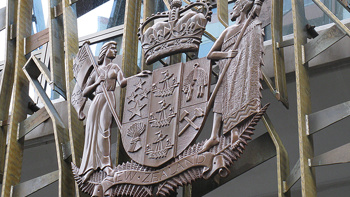
The Prime Minister and other ministers should be removed from Parliament’s Intelligence and Security Committee to ensure the work of agencies responsible for New Zealand’s national security is done independently.
That’s one of the chief findings from the inaugural review of the Intelligence and Security Act 2017 (ISA) - a process required by law every five to seven years, which was brought forward to March, 2022 to consider recommendations made by the Royal Commission of Inquiry into the 2019 Christchurch terrorist attack.
Among several recommendations was a view that New Zealand’s committee should reflect its counterparts in Australia, Canada and the United Kingdom in that members of the Executive - such as the Prime Minister and other ministers - should be prohibited from being members of the committee.
The ISA currently requires the committee to be chaired by the Prime Minister.
The recommendation was founded on the authors’ concerns that the committee lacked independence and didn’t have the capacity to “undertake meaningful scrutiny” of the work of the New Zealand Security Intelligence Service and the Government Communications Security Bureau.
“In its current form, the Committee cannot undertake the necessary oversight function,” the review’s report read.
“We know from discussions with previous and present members of the Committee that it has not performed this function to date and, given its make-up and resources, it would be unreasonable to have expected it to do so.”
Andrew Little is the minister responsible for New Zealand's intelligence and security services. Photo / Marty Melville
In a statement, Prime Minister Chris Hipkins said he would consider the report and “await advice assessing the potential impact” of the recommendations before decisions were made. He also intended to consult with other parties.
“While responding to the review will take time, we are committed to doing so in a timely way to ensure the Act remains clear, effective, and fit for purpose,” he said.
The report found MPs from “significant parties represented in Parliament” should be committee members and its function should include considering and reporting on operational matters such as intelligence collection and production.
The committee could also extend its oversight to other government organisations or agencies with national security responsibilities, such as the police and the New Zealand Defence Force.
The review’s two other main recommendations were removal of the distinction between warrants for New Zealand citizens and non-citizens, and defining what was meant “protection of national security”.
On the former, authors noted the threshold for gaining warrants to carry out actions for the protection of national security regarding non-citizens was easier than for citizens.
They believed it was no longer necessary and should be abolished, something supported by intelligence agencies and unopposed by “other parties” consulted through the review.
“The result would be that New Zealanders and non-New Zealanders would be treated alike in relation to warrants for the protection of national security, and non-New Zealanders would benefit from the higher standard presently applicable only to New Zealanders.”
All warrants would be granted by a minister and a “Commissioner of Intelligence Warrants”, providing safeguards. The report said the two types of warrants were often requested together, meaning there was little practical value in the distinction.
/cloudfront-ap-southeast-2.images.arcpublishing.com/nzme/DNREAB5ZIFCBVFIQBO52LR52M4.jpg)
Security Intelligence Service (SIS) acting director-general Phil McKee (left) and Government Communications Security Bureau (GCSB) director-general Andrew Hampton appeared before the committee in March. Photo / Adam Pearse
However, the authors did advise the distinction between warrants for citizens and non-citizens should remain when seeking approval for activities that will “contribute to New Zealand’s international relations and wellbeing or to its economic wellbeing.
“In essence, this type of warrant can only be granted against a New Zealander where there are reasonable grounds to suspect that the New Zealander is effectively a foreign agent.”
It was also recommended that the “protection of national security” be defined in the Act, given there was no current definition even after a former review called for one to be developed.
The report said it was a necessary step as the Act stated the issuing of warrants to authorise “otherwise unlawful activities” were done so to “contribute to the protection of national security.
Authors proposed the protection of national security should be defined as the protection of New Zealand, its communities and people from threats to the country’s territorial integrity and safety, democratic institutions, multi-cultural social fabric and essential interests.
“A definition would provide some constraint on the Agencies and guidance for those with oversight responsibilities under the ISA, as well as enhancing public understanding of the Agencies’ work.”
Take your Radio, Podcasts and Music with you

/cloudfront-ap-southeast-2.images.arcpublishing.com/nzme/7ZWNYZ4ZQJHMFBGYEG4CRZLDEE.JPG)








